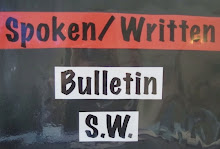Wednesday, 30 December 2009
Big Thanks to Spoken/Written's Contributors
Monday, 30 November 2009
Why Should Spoken/Written Charge?
Why should anyone pay for Spoken/Written? Because of all the lateral searches the Editor does on your behalf. Hours spent trawling through newsletters that most people give up on as junk mail or spam, looking for the nugget that’s an opportunity. Combination word searches in dozens of different mixtures through Google to get what can be found out there on the vast and ever-expanding web. Going through huge websites with a fine tooth comb seeking the news that’s of relevance to the South West or writers of this or that genre. Choice zines from the plethora of stuff. As many competitions that are free or via e-mail as can be found so you can enter them with maximum speed, minimum hassle. Trawling through what gets sent in and then standardizing its format. Keeping pace with an inbox where you can hardly keep up with where to put e-mails in folders so they're where you need when you want them...hoping you neither miss something vital for the Bulletin, nor other work coming in. Checking entries for dead links or dodgy small print. The work that I would have liked to do for myself if I had the time. Except that I don’t. And neither do you. Which is why the Editor has to be paid. And why if you value what makes this service different, I’m requesting you send some money. Being Editor, it’s amazing how many times I think – I must chase that up – and then with time so tight, and the last edition out of the way, rarely do. Efficiency is what some people know me for, yet when trying to go for five things from a couple of editions, early in the year, an application to one was found all filled in, stamped, unposted, too late. Another arrived five hours after the deadline to be rejected. I looked up editions from this time last year to check whether some event was still running in December – couldn’t believe the things I hadn’t gone for in it. There’s never time. And with Spoken/Written taking up a third of all working time in a year, and the last six months yielding half the amount in sub fees etc. that four days workshops work brought in…That’s not something the Editor – however much I care about this service – can afford to keep up much longer unless MORE PEOPLE PAY SUB FEES. At;
http://www.cartwheels-collective.co.uk/Spoken_Written_Bulletin.html
I hope this explains the position of Spoken/Written a little better. Massive thanks again to all those who have contributed, you are high in Spoken/Written and its Editor's esteem. Bless you all.
Spoken/Written Bulletin S.W.
Monday, 23 November 2009
Check out The Vibe!
Friday, 6 November 2009
Halloween Play Day
Thursday, 8 October 2009
Publishing a Second Edition
Saturday, 3 October 2009
Storyclub Upstairs at the Globe
Tuesday, 1 September 2009
Sunrise OffGrid and Beautiful Days
Thursday, 6 August 2009
Play Day Mayhem
Saturday, 1 August 2009
The Grass is Always Greener
Festivals and Form Fillings
Friday, 24 July 2009
Publishing a Book – Part 2
Nobody can truly learn from another’s experience in the way that people mean when they say ‘I’ve suffered so you don’t have to’. But by hearing what the person in question has to say, they can, I guess, at least make some kind of judgement. People have asked my advice, or what I think from time to time about writing and publishing a book (or books) as someone that's done so. So here’s a summary. Writing the book is easy. Of course you need to have reasonably mastered a good to excellent standard of spelling, grammar, character, plot, technical or experimental competence. To have an idea, a passion to write, or rather to write actively. And of course to have finished the damn thing. But that part – if you are a writer, i.e. you write because you must – is the simple part. The proof reading, editing, back cover blurb writing, page layout, page numbering, prelims and all the rest is the really dull grinding bit. The printing is the really stressful bit…And the selling is the actual hard work.
So what does the real hard work that now begins, involve? You ring shops, venues, places that may or should be interested, T.I.s for local interest links, museums if it’s a historical novel; only some are interested, some (overloaded with such enquiries) aren’t even polite! Some will take it, but on terms where you make no profit…You spend the next months delivering books, designing posters, putting them up, handing out flyers, trying to remember to take books with you wherever you go. When the weather’s not too cold or wet and when you’ve time from your other commitments, you hold stalls, make free gifts and give them away, make more signs, outdoor ones this time, put the price up when you realize how little you’re making for the sheer work you’re putting in… You write or e-mail and tell anyone acknowledged in the credits perhaps, for instance thanking them for inspiration – don’t expect a reply! It’s polite to tell them you’ve mentioned them, but well known authors/broadcasters or whoever are notoriously busy, and it could fall by the inbox. A good idea is tell the local rag and write some interesting copy for them – they may well take it. Many say it’s good to have a working relationship with whoever deals with local events news on the said paper regarding any signings and stuff. In my experience though, most of the publicity you’ll have to do yourself, but a mention in the paper does help.
Next is organizing events at which to promote and sell the book – whether signings and readings at bookshops (if you’ve opted for an ISBN) and have persuaded some bookshops to take it, or events which are basically shows, at which you sell the book at the same stall you have for the programmes and any other merchandise. One writer I know had some fantastic t-shirts on sale for a winter tour of one of his books! So for the event/s in question, there are the tickets – a box office or printing them yourself? Flyers, more posters, cards, rehearsals, checking technical stuff like sound and any lighting…spamming people you know, know of and hardly know, a notebook so people can join your ‘mailing list’ if they wish…and a load of other tasks that properly belong to a performer’s blog. Even after all this – once you’ve put some in shops which take all the profit – and taking into account everything from a folding table to new printer ink at a £160 a shot for a decent laser printer cartridge – you’ll have to sell all of the first print run to break even. The question you then must ask yourself is – can you face a second? Time to sit down and work out the maths of costs; if you broke even, made a loss, or profit… Then looking at the issue of a bigger print run vs. more travel to more events to sell it, and…..
Remember – the first print run may have been a success, but some at least were sold to people you know…the second print run will be mostly sold to strangers. Yep, that’s right – it’s going to be even harder…the one thing that will make it easier is all the stuff you learned during the first print run.
I guess that may answer the question - how come the average sales of a self published book are 100-150… And the next question must be not - how come more people don’t publish their own books, nor how come so many do, but how many go on to the second print run…..?
Publishing a Book – Part 1
Rather than – why do more people not publish their own books, especially if they’re not happy for whatever reason with the state of mainstream publishing? surely the question should rather be – how come anyone (who isn’t rolling in cash) publishes a book themselves?
Publishing a book in one way has never been simpler – there are print on demand and small print run printers and publishers everywhere, all offering different deals and services, from basic binding to ISBNs to listings on Amazon to claims to market them for you – the works. In another way of course, it’s just as hard as it’s always been. The simplest deal of all is just getting someone to print and bind it. That leaves you with editing, proof reading (sensationally dull for a 200 page book), page layout (try it on pirated software! For the full ‘I’ll get a hammer to that machine yet…’ effect), book cover design (if you’ve mastered a graphics programme or are lucky enough to know someone who has) with all the ‘no, left, no I’d like a terracotta wash, can I change this bit?’ ‘NO!’…prelims, page numbers (they’re always good for a laugh!). Next come the PDFs, putting it all, back cover, spine, the works, into two or three Print Ready Files. If the format still looks the same, congratulations! And remember, the cover must be sized to a standard book size like 197 x 132…not forgetting a 3mm ‘bleed’ all the way round for binding – so don’t bother with a border unless you’re feeling sharp as a needle. Then off the PDFs go – after shouting matches, breaking glasses, and if you’re really in mayhem central by then, somebody you know chooses one of the most stressful days of the year to hassle you about something…thereby ensuring you have a seriously memorable day, the first time you send off a book for proper grown up binding…
Then a bit later on, the proof copy arrives and you see for the first time (all printers being different) that the cover is too dark/blurred/unrelated to the contents of the book…and of course, there’s no time to change it, AND you’d be charged for it, so because you’re doing this with minimum time and a fixed budget, you don’t. But it does show you at least that all your page numbers are all on the right – yes, even the pages on the left…so you sort that out, after more cursing and tearing up paper, and then send it off back again… A couple of weeks later a box of books arrives.
For extra added enjoyment, sorry nightmare, get 10 ISBNs – the majority of which you don’t need right now, give away some free copies to copyright libraries and fill in forms for Nielsen BookData… But for smaller print runs, and especially ones which will mainly be sold at events, opinion is divided about whether an ISBN is worth the bother or not. I’ve heard some writers say they wouldn’t be without them. Some say it helped promotion, if not actual selling of copies. But others I’ve spoken to have said it was a waste of money and did no good at all. Take your pick. Think about what it is, who and where it’ll be sold to and at.
And THAT’S just the beginning. Because it’s at that point that the real work begins – that of selling it. Now you’ve got the box of books, you’ve got to get rid of the contents…..




